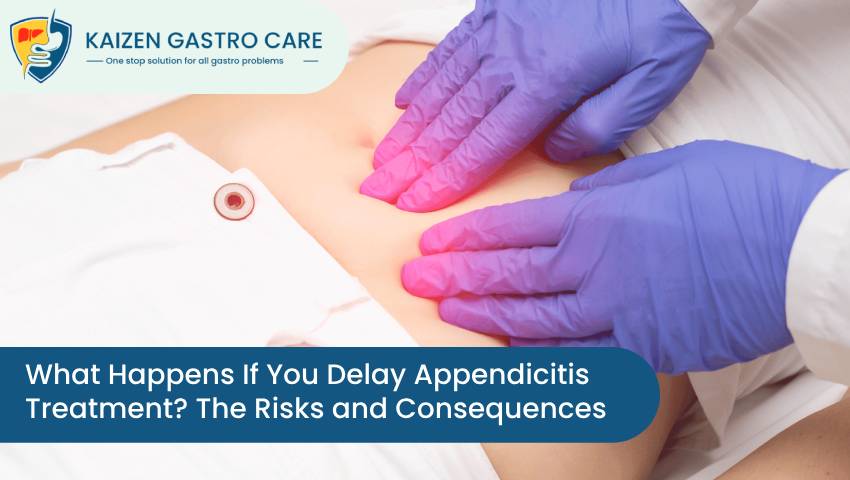
- 13/01/2025
- Kaizen Gastro Care
- 0 Comments
- Gut Health
What Happens If You Delay Appendicitis Treatment? The Risks and Consequences
The appendix, a small pouch attached to the large intestine, can become inflamed and infected, causing intense abdominal pain. When left untreated, this condition can rapidly escalate into life-threatening complications. As a leading gastroenterologist and gastrointestinal surgeon in Pune at Kaizen Gastro Care Clinic, Dr. Samrat Jankar emphasizes the importance of timely diagnosis and treatment. Delaying appendicitis treatment can have serious consequences, ranging from the spread of infection to irreversible organ damage. Here’s a closer look at the risks of postponing appendicitis treatment:
- Rupture of the Appendix: One of the most harmful consequences of delaying appendicitis treatment is the risk of the appendix rupturing. When the appendix bursts, it releases infectious materials into the abdominal cavity, leading to widespread infection. A ruptured appendix can cause peritonitis, a life-threatening condition that needs emergency surgery.
- Peritonitis: Peritonitis is an infection of the peritoneum (the lining of the abdominal cavity), which can develop when bacteria from a ruptured appendix spreads throughout the abdomen. Signs of peritonitis include severe abdominal pain, fever, rapid heartbeat, and swelling of the abdomen. Peritonitis requires prompt medical attention and can result in organ failure if not treated promptly.
- Abscess Formation: If the appendix ruptures, the body may try to localize the infection by forming an abscess, a pocket of pus surrounding the infected area. While an abscess may temporarily contain the infection, it still poses a serious risk to your health. The abscess can grow larger and potentially rupture, leading to sepsis – a systemic, life-threatening infection that can damage multiple organs.
- Sepsis: Sepsis is one of the most dangerous consequences of untreated appendicitis. This condition happens when the infection spreads throughout the body, triggering widespread inflammation and organ dysfunction. Sepsis can cause painful complications such as organ failure, shock, and even death. The longer appendicitis goes untreated, the greater the risk of developing sepsis.
- Increased Recovery Time: Delaying appendicitis treatment doesn’t only increase the risk of complications; it can also extend the recovery time. If the appendix bursts or complications appear, patients often need more extensive surgery and longer hospital stays. Recovery time may also increase as additional treatments, such as antibiotics or drainage techniques, may be required.
- Chronic Pain and Complications: In some cases, untreated appendicitis can lead to chronic abdominal pain and long-term gastrointestinal problems. This can significantly affect the quality of life and may need ongoing treatment or further surgeries.
- Long-Term Complications: Delaying appendicitis treatment can also improve the risk of long-term complications, such as bowel obstruction or adhesions. These complications may result in chronic pain or digestive problems and may require additional surgery to correct.
- Risk to Overall Health: The longer the appendicitis goes untreated, the greater the strain it places on the body. The infection can spread to other organs, and the body’s immune system becomes overwhelmed. This can lead to multiple organ failure, resulting in painful consequences for your overall health and potentially leading to a life-threatening condition.
What to Do If You Suspect Appendicitis:
Identifying the symptoms of appendicitis early can prevent complications. These symptoms may include:
- Severe abdominal pain, normally starting around the belly button and shifting to the lower right side
- Nausea and vomiting
- Loss of appetite
- Fever
- Constipation or diarrhea
- Swelling or bloating in the abdomen
If you or someone you know is experiencing these signs, especially if the pain is worsening or localized to the right lower abdomen, consult an appendix specialist in Pune immediately.
Why Immediate Treatment Is Key?
Early diagnosis and treatment of appendicitis commonly involve a laparoscopic appendectomy, a minimally invasive procedure where the appendix is removed through small incisions. This approach offers several benefits, including less pain, a shorter hospital stay, and quicker recovery. However, when appendicitis is delayed, more invasive treatments, longer recovery times, and a higher risk of complications become necessary.
Conclusion:
Timely treatment of appendicitis is critical to preventing serious complications such as perforation, abscess formation, sepsis, and chronic health issues. If you suspect appendicitis, don’t wait – contact the best appendicitis specialist in Pune, Dr. Samrat Jankar, and the expert team at Kaizen Gastro Care Clinic for immediate evaluation and treatment. Early intervention can help ensure a smoother recovery and reduce the risk of life-threatening complications.
For more information or to schedule a consultation, please contact Kaizen Gastro Care Clinic. Don’t delay treatment – your health is too important.
